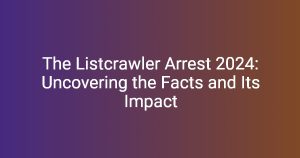Edgar Guzmán López is a name synonymous with the complexities of the contemporary drug trade, particularly in Mexico. As a significant figure associated with the Sinaloa Cartel, Guzmán López’s life story intertwines with themes of power, loyalty, and betrayal that define the narcotics landscape of the region. This article delves deep into the life of Edgar Guzmán López, uncovering the pivotal moments that shaped his influence in criminal networks and the broader implications of his activities on drug trafficking in Mexico and beyond.
Early Life and Background
Family Background
Edgar Guzmán López was born into a family deeply embroiled in the drug trade. He was the son of Joaquín “El Chapo” Guzmán, one of the most notorious drug lords in history. This relationship laid the foundation for his future involvement in criminal activities and provided him with early access to the intricate world of drug trafficking, shaping his views on loyalty and power.
Childhood and Education
Growing up in Sinaloa, a region known for its agricultural production and infamous for its drug cartels, Edgar Guzmán López experienced a childhood that was more reflective of crime than innocence. Early influences from his father’s criminal endeavors fostered an environment where illegal activities seemed not only acceptable but expected. His education, though disrupted by his family’s lifestyle, showcased early signs of leadership and ambition—qualities essential for rising through the ranks of the Sinaloa Cartel.
Involvement in Drug Trafficking
Entry into the Drug Trade
Edgar Guzmán López began his foray into the drug trade under the shadow of his father’s empire. His initial roles within the Sinaloa Cartel were modest, often involving logistical support and facilitating drug shipments. However, as he honed his skills and gained the trust of key cartel members, he transitioned from these minor roles to more significant positions, strategically covering various aspects of the drug trade.
Key Contributions to the Sinaloa Cartel
Throughout his tenure with the Sinaloa Cartel, Edgar Guzmán López made several key contributions that solidified his reputation. He played a crucial role in orchestrating complex drug logistics, developing routes that allowed for expansive trafficking, particularly across the U.S. border. His ability to forge relationships with other key figures within the cartel enhanced their operations, making the Sinaloa Cartel one of the most powerful drug trafficking organizations in the world.
Leadership and Influence
Rise to Power
Guzmán López’s ascent within the cartel hierarchy can be attributed to his inherent understanding of the drug trade and his ability to manipulate the socio-political landscape. Key events, such as the arrest of rival cartel leaders, created a power vacuum that Edgar Guzmán López was quick to fill. This opportunism, combined with his undying loyalty to his family, propelled him into a position of notable power.
Criminal Strategies
What set Edgar Guzmán López apart from many of his peers were his innovative methods of operation. His techniques ranged from advanced smuggling routes to intricate money laundering operations. He implemented novel strategies that not only optimized their operations but also helped evade law enforcement scrutiny, ensuring the cartel maintained its grip on power.
Relationship with Law Enforcement
Encounters with Authorities
Throughout his criminal career, Edgar Guzmán López had several notable encounters with law enforcement. These instances often highlighted the cat-and-mouse game between authorities and drug traffickers. His ability to evade capture on numerous occasions showcased both the effectiveness of his strategies and the daunting challenges faced by law enforcement. Disguises, safehouses, and preemptive strategies were among the tactics he employed to stay one step ahead.
Collaboration and Betrayal
The world of the Sinaloa Cartel was not just about loyalty; it was also about betrayal. Edgar Guzmán López‘s rise was marred by instances of betrayal both within the ranks of the cartel and by potential informants. The precarious nature of his relationships often led to violent confrontations and increased tension, ultimately affecting the internal dynamics of the Sinaloa Cartel.
Death and Aftermath
Circumstances Surrounding His Death
On his path through the drug trade, Edgar Guzmán López‘s life ended tragically, marking a significant turning point for the Sinaloa Cartel. His death occurred under dramatic circumstances, leading to instability within the cartel as factions vied for power in the wake of his passing. This event was pivotal—not just for the cartel, but for trade patterns across Mexico.
Legacy and Impact on Drug Trade
The legacy of Edgar Guzmán López is a complicated tapestry woven with themes of power and consequence. His death led to a fragmentation within the Sinaloa Cartel, impacting drug trafficking routes and methods significantly. The shifting dynamics of the cartel post-Guzmán López forced other criminal enterprises to adapt, showcasing the broader implications his actions had on the drug trade in Mexico and globally.
Public Perception and Media Representation
Portrayal in Media
The media’s portrayal of Edgar Guzmán López has oscillated between fascination and horror. Numerous films and documentaries have chronicled his life, shaping the public’s understanding of drug lords in contemporary society. Documentaries highlight the gruesome realities of drug trafficking, often sensationalizing the lives of figures like Guzmán López while providing glimpses into the complexities of their existence.
Cultural Impact
The cultural impact of Edgar Guzmán López extends beyond mere media portrayal. His life has influenced various aspects of popular culture, from music to film, often romanticizing the role of the drug kingpin. This sensationalism raises questions about how society perceives the ramifications of drug trafficking and its broader societal implications.
Conclusion
Summary of Key Points
In exploring the life and legacy of Edgar Guzmán López, we recognize a figure whose influence resonated through the corridors of power in the Sinaloa Cartel. His strategic mind, combined with familial loyalty, crafted a story of ambition and tragedy that reflects the ongoing challenges of drug-related crime in Mexico.
Future Implications
The legacy of Edgar Guzmán López serves as a stark reminder of the cycle of violence and power that defines the drug trade. As new players emerge in the cartel landscape, the patterns established by figures like Guzmán López continue to influence modern drug trafficking operations. The ongoing struggles against drug-related crime highlight the need for a multifaceted approach to addressing these challenges.
| Key Event | Date | Impact on Cartel |
|---|---|---|
| Birth of Edgar Guzmán López | [Year] | Established lineage within the Sinaloa Cartel |
| Entry into Drug Trade | [Year] | Transition from minor roles to major influence |
| Death of Edgar Guzmán López | [Date] | Increased power struggles within the cartel |
| Media Representation Surge | [Year] | Increased public interest in drug trafficking narratives |
FAQs
- What was Edgar Guzmán López’s relationship with El Chapo? Guzmán López was the son of Joaquín “El Chapo” Guzmán and was directly influenced by his father’s criminal empire.
- How did Edgar Guzmán López rise in the Sinaloa Cartel? Through strategic insights and a deep understanding of the drug trade, he navigated the cartel’s hierarchy effectively.
- What were some of the key strategies employed by Guzmán López? His methods included innovative smuggling techniques and extensive money laundering operations.
- What impact did Guzmán López’s death have on the Sinaloa Cartel? His death led to significant power struggles and changes in drug trafficking routes within the cartel.
- How is Guzmán López portrayed in popular culture? He has been depicted in various films and documentaries, influencing public perception of drug lords.
- What legacy did Edgar Guzmán López leave behind? His legacy is characterized by questions of loyalty, power, and the continuing challenges of drug trafficking in Mexico.
- What are some practical approaches to understanding the drug trade? Engaging with credible documentary and literature provides insights into the complexities surrounding figures like Guzmán López.
- How do media narratives shape the public’s understanding of drug trafficking? Sensationalization in media often influences societal perceptions, romanticizing the lives of drug lords while obscuring the associated consequences.



